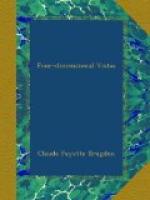“Parmenides,” says Hinton, “and the Asiatic thinkers with whom he is in close affinity, propound a theory of existence which is in close accord with a conception of a possible relation between a higher and a lower-dimensional space.” He concludes, “Either one of two things must be true, that four-dimensional conceptions give a wonderful power of representing the thought of the East, or that the thinkers of the East must have been looking at and regarding four-dimensional existence.”
It would not be difficult to re-state, in terms of our hypothesis, Plato’s doctrine of an enduring archetypal world of ideas reflected in a world of transitory images and appearances. Fortunately, Plato has relieved the author of that necessity by doing it himself in his wonderful allegory of the shadow-watchers in The Republic. The trend of his argument is clear; as its shadow is to a solid object, so is the object itself to its archetypal idea. This is the manner in which he presents this thought:
“Imagine a number of men living in an underground cavernous chamber, with an entrance open to the light, extending along the entire length of the cavern, in which they have been confined, from their childhood, with their legs and neck so shackled, that they are obliged to sit still and look straight forwards, because their chains render it impossible for them to turn their heads round: and imagine a bright fire burning some way off, above and behind them, and an elevated roadway passing between the fire and the prisoners, with a low wall built along it, like the screens which conjurors put up in front of their audience, and above which they exhibit their wonders.”
“I have it,” he replied.
“Also, figure to yourself a number of persons walking behind this wall, and carrying with them statues of men, and images of other animals, wrought in wood, stone, and all kinds of materials, together with various other articles, which overtop the wall; and, as you might expect, let some of the passers-by be talking, and others silent”
“You are describing a strange scene, and strange prisoners.”
“They resemble us,” I replied. “For let me ask you, in the first place, whether persons so confined could have seen anything of themselves or of each other, beyond the shadows thrown by the fire upon the part of the cavern facing them.”
“Certainly not, if you suppose them to have been compelled all their lifetime to keep their heads unmoved.”
“And is not their knowledge of the things carried past them equally limited?”
“Unquestionably it is.”
“And if they were able to converse with one another, do you not think that they would be in the habit of giving names to the objects which they saw before them?”
“Doubtless they would.”
“Again: if their prison house returned an echo from the part facing them, whenever one of the passers-by opened his lips, to what, let me ask you, could they refer the voice, if not to the shadow which was passing?”




